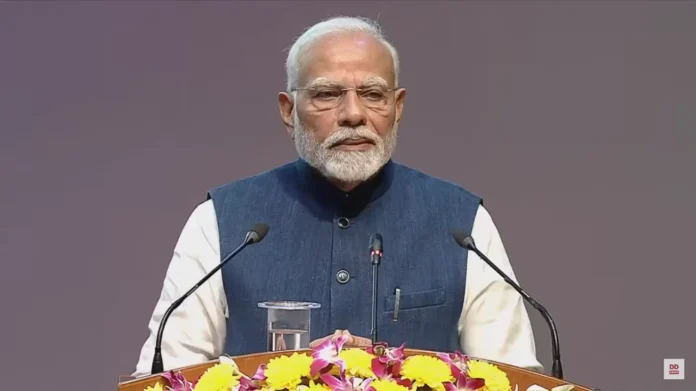Prime Minister Narendra Modi on Sunday underscored that the goal of “ease of justice” must complement India’s efforts toward “ease of living” and “ease of doing business.” Speaking at the National Conference on Strengthening Legal Aid Delivery Mechanisms, organised by the National Legal Services Authority (NALSA), the Prime Minister said that justice should be accessible to all, irrespective of social or economic background.
He emphasised that technology has the power to democratise opportunity when used with a people-centric approach. Initiatives like e-filing, virtual court hearings, and translation of judgments into regional languages, he noted, are helping make the justice system more transparent and inclusive.
Highlighting key reforms undertaken by his government, the Prime Minister mentioned that more than one crore citizens have benefited from early legal advice through the Tele-Law programme. He also pointed out that over 40,000 outdated compliances have been removed, more than 3,400 offences have been decriminalised, and around 1,500 obsolete laws have been repealed. Additionally, over 80,000 court judgments have been translated into 18 Indian languages to make legal knowledge more accessible.
Chief Justice of India D.Y. Chandrachud, Justice B.R. Gavai, NALSA Executive Chairperson Justice Surya Kant, and Union Law Minister Arjun Ram Meghwal were also present at the conference. They stressed that while technology can improve access to justice, empathy, linguistic inclusivity, and awareness at the grassroots level are equally vital.
Justice Gavai recalled an instance from a relief camp where a woman expressed gratitude for simply being heard, illustrating that the true value of legal aid lies in its human impact rather than in statistics.
Concluding his address, Prime Minister Modi launched a new community mediation training module, calling it an effort to strengthen India’s tradition of resolving disputes through dialogue and mutual understanding. He also reaffirmed the government’s commitment to expanding legal awareness among women, senior citizens, and marginalised communities.


